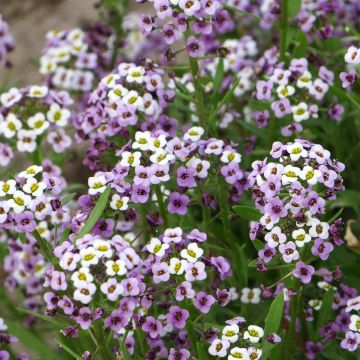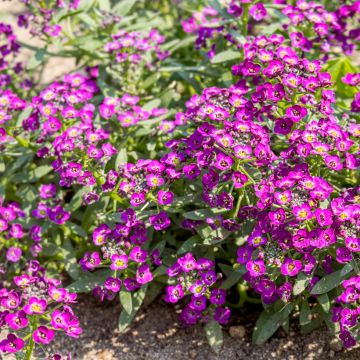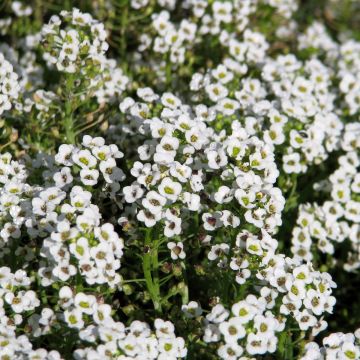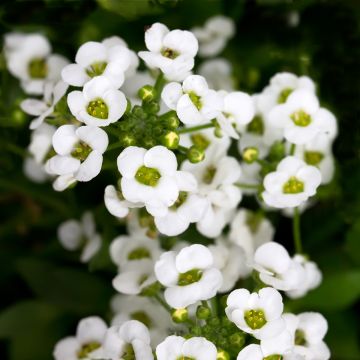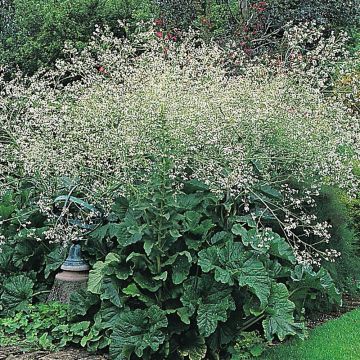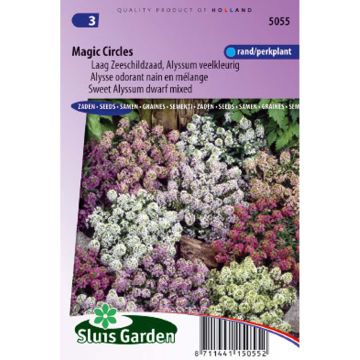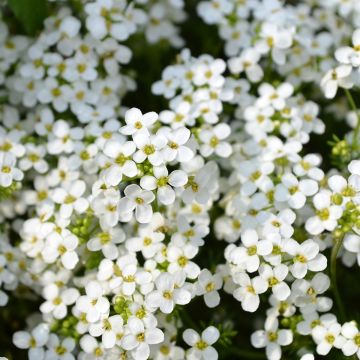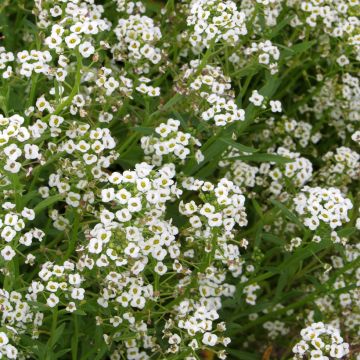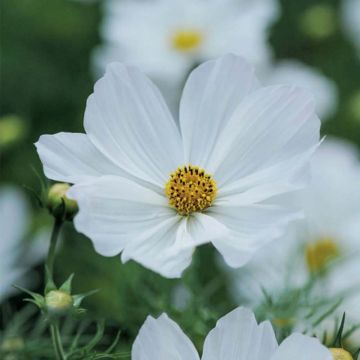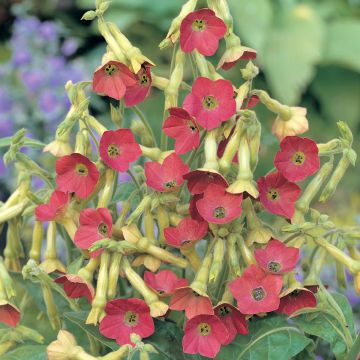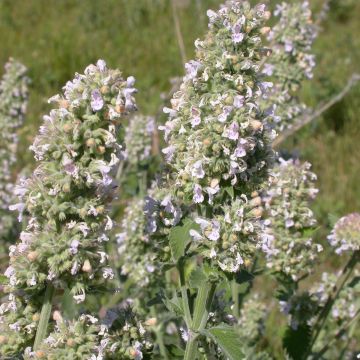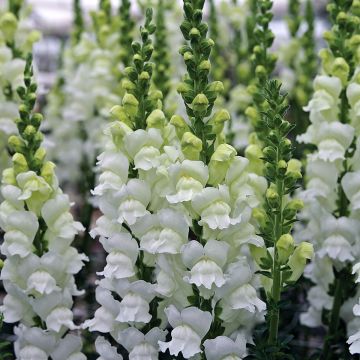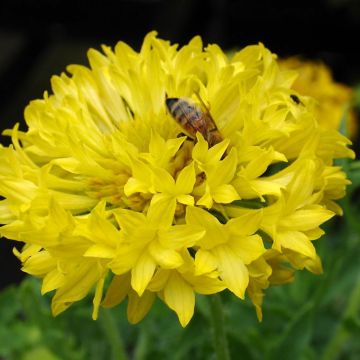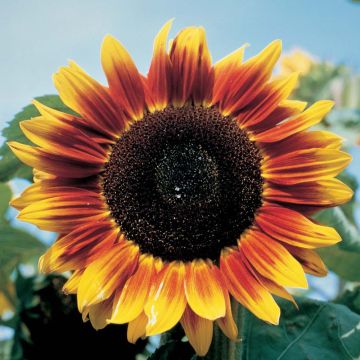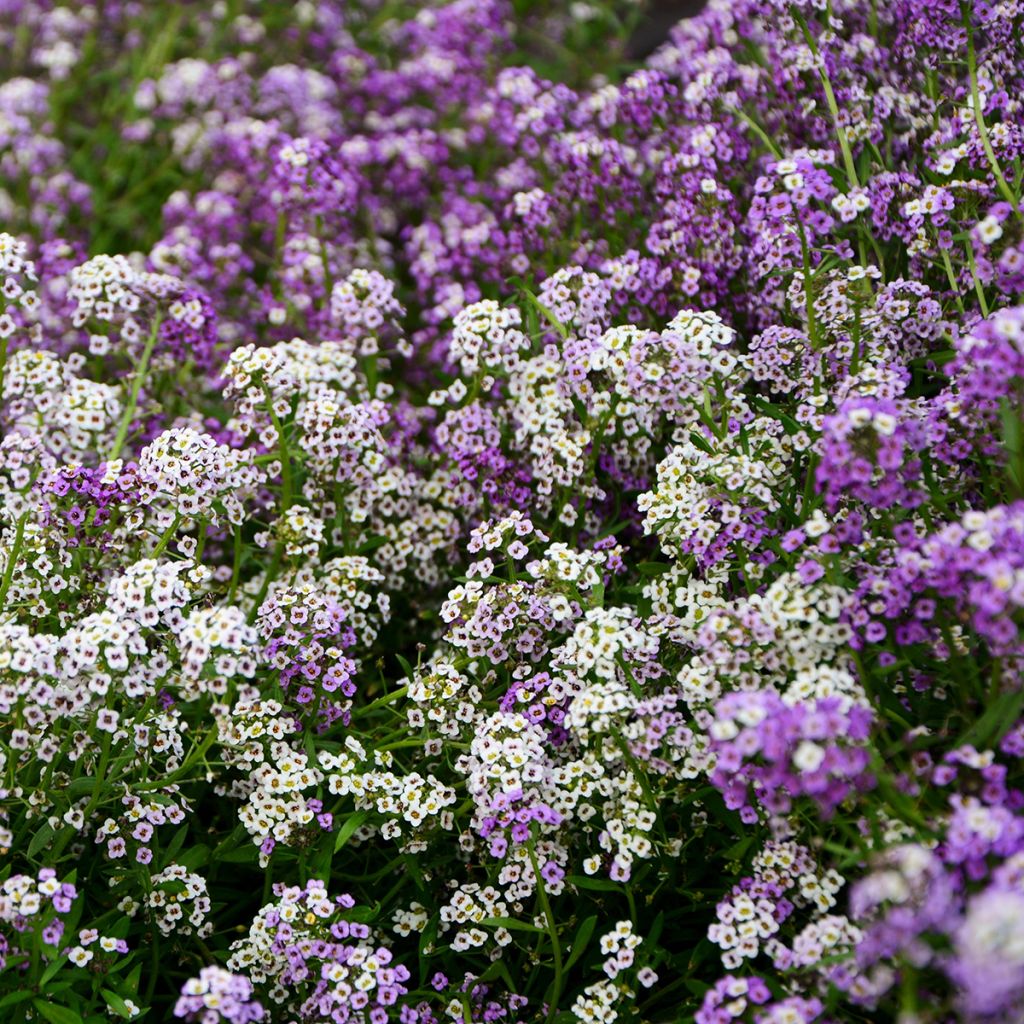

Lobularia maritima Wandering Mix - seeds
Lobularia maritima Wandering Mix - seeds
Lobularia maritima Wandering Mix
Sweet Alyssum, Sweet Alison, Sea Alyssum
Special offer!
Receive a €20 voucher for any order over €90 (excluding delivery costs, credit notes, and plastic-free options)!
1- Add your favorite plants to your cart.
2- Once you have reached €90, confirm your order (you can even choose the delivery date!).
3- As soon as your order is shipped, you will receive an email containing your voucher code, valid for 3 months (90 days).
Your voucher is unique and can only be used once, for any order with a minimum value of €20, excluding delivery costs.
Can be combined with other current offers, non-divisible and non-refundable.
Home or relay delivery (depending on size and destination)
Schedule delivery date,
and select date in basket
This plant carries a 6 months recovery warranty
More information
We guarantee the quality of our plants for a full growing cycle, and will replace at our expense any plant that fails to recover under normal climatic and planting conditions.
Would this plant suit my garden?
Set up your Plantfit profile →
Description
'Wandering Mix' is a mix of Lobularia maritima or fragrant Alyssum selected for their pastel and varied, pleasantly scented flowers. The plants in this selection form lovely dense cushions that bloom all summer. Their infinitely delicate little flowers are so numerous that they completely hide the foliage. Fragrant alyssum is a perfect annual plant for rock gardens and flower pots. Robust and sturdy, resistant to bad weather and sea spray, it is also very useful by the seaside and in dry gardens. Plant in the sun, in well-drained, even poor and chalky soil.
Maritime alyssum is an annual plant belonging to the Brassicaceae family. This species is native to southern Europe and the Mediterranean region. Widely cultivated in gardens, it has given rise to numerous horticultural varieties. Alyssum 'Wandering Mix' brings together several varieties in white, cream, mauve, pink, and even purple tones. Each plant forms woody-based, dense and prostrate herbaceous clumps, 15-20 cm in height and 25 cm in width, in the year after sowing. Resembling a weed at first, it then transforms into an imposing clump of branched stems, adorned with small glaucous green, alternate, simple and entire, narrow (from lanceolate to linear), quite hairy leaves. Flowering extends from June to September, completely covering the plant with small flowers with a delightful honey fragrance. This flowering attracts many pollinating insects.
Too rarely used in gardens, maritime alyssum thrives in the sun in well-drained soils. They are perfect plants for covering the tops of walls, the spaces between rocks in rockeries and filling the base of perennials and shrubs. They can also be planted along a path, in well-drained soil. They perform very well in pots and containers. Some ideas for associations: with rock cresses, candytufts, and rock cresses.
Report an error about the product description
Flowering
Foliage
Plant habit
Botanical data
Lobularia
maritima
Wandering Mix
Brassicaceae
Sweet Alyssum, Sweet Alison, Sea Alyssum
Cultivar or hybrid
Other Alyssum seeds
View all →Planting and care
Sow the Wandring Mix alyssum seeds from late March to May, at 15-29 °C, on the surface of good quality compost. Keep the soil moist, but not waterlogged, and keep the sowing in the light. Place in a mini-greenhouse, or enclose the seed tray inside a polyethylene bag until germination, which takes between 7 and 30 days. When the plants are large enough to handle, transplant and grow them in cooler conditions until they are big enough to be planted outside. When the plants are well developed and all risk of frost has passed, start acclimatising them to outdoor conditions for 7 to 10 days. Transplant outside, in full sun, in sandy or gravelly, well-drained, light soil, with each plant at a distance of 30 cm.
Another option: sow the alyssum outside in May, directly in the open ground, in well-prepared and lightened soil.
Sowing period
Intended location
This item has not been reviewed yet - be the first to leave a review about it.
Similar products
Haven't found what you were looking for?
Hardiness is the lowest winter temperature a plant can endure without suffering serious damage or even dying. However, hardiness is affected by location (a sheltered area, such as a patio), protection (winter cover) and soil type (hardiness is improved by well-drained soil).

Photo Sharing Terms & Conditions
In order to encourage gardeners to interact and share their experiences, Promesse de fleurs offers various media enabling content to be uploaded onto its Site - in particular via the ‘Photo sharing’ module.
The User agrees to refrain from:
- Posting any content that is illegal, prejudicial, insulting, racist, inciteful to hatred, revisionist, contrary to public decency, that infringes on privacy or on the privacy rights of third parties, in particular the publicity rights of persons and goods, intellectual property rights, or the right to privacy.
- Submitting content on behalf of a third party;
- Impersonate the identity of a third party and/or publish any personal information about a third party;
In general, the User undertakes to refrain from any unethical behaviour.
All Content (in particular text, comments, files, images, photos, videos, creative works, etc.), which may be subject to property or intellectual property rights, image or other private rights, shall remain the property of the User, subject to the limited rights granted by the terms of the licence granted by Promesse de fleurs as stated below. Users are at liberty to publish or not to publish such Content on the Site, notably via the ‘Photo Sharing’ facility, and accept that this Content shall be made public and freely accessible, notably on the Internet.
Users further acknowledge, undertake to have ,and guarantee that they hold all necessary rights and permissions to publish such material on the Site, in particular with regard to the legislation in force pertaining to any privacy, property, intellectual property, image, or contractual rights, or rights of any other nature. By publishing such Content on the Site, Users acknowledge accepting full liability as publishers of the Content within the meaning of the law, and grant Promesse de fleurs, free of charge, an inclusive, worldwide licence for the said Content for the entire duration of its publication, including all reproduction, representation, up/downloading, displaying, performing, transmission, and storage rights.
Users also grant permission for their name to be linked to the Content and accept that this link may not always be made available.
By engaging in posting material, Users consent to their Content becoming automatically accessible on the Internet, in particular on other sites and/or blogs and/or web pages of the Promesse de fleurs site, including in particular social pages and the Promesse de fleurs catalogue.
Users may secure the removal of entrusted content free of charge by issuing a simple request via our contact form.
The flowering period indicated on our website applies to countries and regions located in USDA zone 8 (France, the United Kingdom, Ireland, the Netherlands, etc.)
It will vary according to where you live:
- In zones 9 to 10 (Italy, Spain, Greece, etc.), flowering will occur about 2 to 4 weeks earlier.
- In zones 6 to 7 (Germany, Poland, Slovenia, and lower mountainous regions), flowering will be delayed by 2 to 3 weeks.
- In zone 5 (Central Europe, Scandinavia), blooming will be delayed by 3 to 5 weeks.
In temperate climates, pruning of spring-flowering shrubs (forsythia, spireas, etc.) should be done just after flowering.
Pruning of summer-flowering shrubs (Indian Lilac, Perovskia, etc.) can be done in winter or spring.
In cold regions as well as with frost-sensitive plants, avoid pruning too early when severe frosts may still occur.
The planting period indicated on our website applies to countries and regions located in USDA zone 8 (France, United Kingdom, Ireland, Netherlands).
It will vary according to where you live:
- In Mediterranean zones (Marseille, Madrid, Milan, etc.), autumn and winter are the best planting periods.
- In continental zones (Strasbourg, Munich, Vienna, etc.), delay planting by 2 to 3 weeks in spring and bring it forward by 2 to 4 weeks in autumn.
- In mountainous regions (the Alps, Pyrenees, Carpathians, etc.), it is best to plant in late spring (May-June) or late summer (August-September).
The harvesting period indicated on our website applies to countries and regions in USDA zone 8 (France, England, Ireland, the Netherlands).
In colder areas (Scandinavia, Poland, Austria...) fruit and vegetable harvests are likely to be delayed by 3-4 weeks.
In warmer areas (Italy, Spain, Greece, etc.), harvesting will probably take place earlier, depending on weather conditions.
The sowing periods indicated on our website apply to countries and regions within USDA Zone 8 (France, UK, Ireland, Netherlands).
In colder areas (Scandinavia, Poland, Austria...), delay any outdoor sowing by 3-4 weeks, or sow under glass.
In warmer climes (Italy, Spain, Greece, etc.), bring outdoor sowing forward by a few weeks.






























